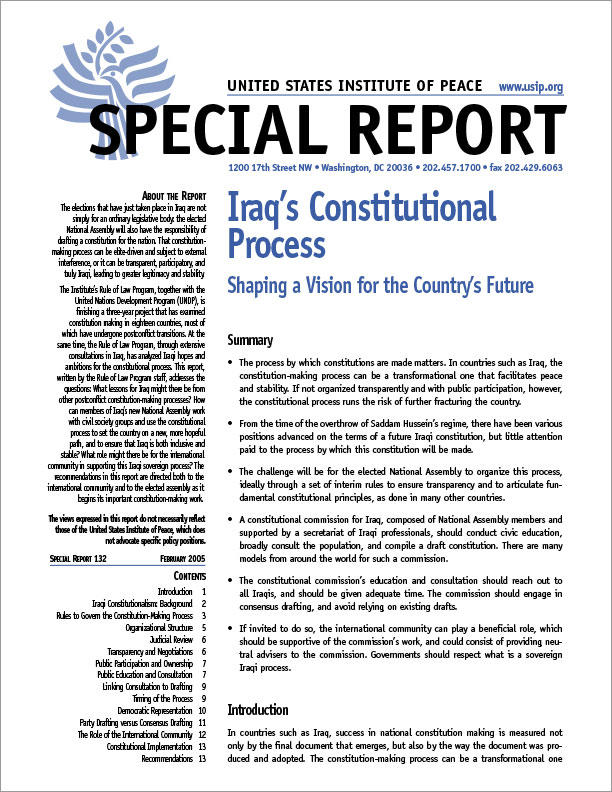The elections that have just taken place in Iraq are not simply for an ordinary legislative body: the elected National Assembly will also have the responsibility of drafting a constitution for the nation. That constitution-making process can be elite-driven and subject to external interference, or it can be transparent, participatory, and truly Iraqi, leading to greater legitimacy and stability.

Summary
- The process by which constitutions are made matters. In countries such as Iraq, the constitution-making process can be a transformational one that facilitates peace and stability. If not organized transparently and with public participation, however, the constitutional process runs the risk of further fracturing the country.
- From the time of the overthrow of Saddam Hussein's regime, there have been various positions advanced on the terms of a future Iraqi constitution, but little attention paid to the process by which this constitution will be made.
- The challenge will be for the elected National Assembly to organize this process, ideally through a set of interim rules to ensure transparency and to articulate fundamental constitutional principles, as done in many other countries.
- A constitutional commission for Iraq, composed of National Assembly members and supported by a secretariat of Iraqi professionals, should conduct civic education, broadly consult the population, and compile a draft constitution. There are many models from around the world for such a commission.
- The constitutional commission's education and consultation should reach out to all Iraqis, and should be given adequate time. The commission should engage in consensus drafting, and avoid relying on existing drafts.
- If invited to do so, the international community can play a beneficial role, which should be supportive of the commission's work, and could consist of providing neutral advisers to the commission. Governments should respect what is a sovereign Iraqi process.
About the Report
The elections that have just taken place in Iraq are not simply for an ordinary legislative body: the elected National Assembly will also have the responsibility of drafting a constitution for the nation. That constitution-making process can be elite-driven and subject to external interference, or it can be transparent, participatory, and truly Iraqi, leading to greater legitimacy and stability.
The Institute's Rule of Law Program, together with the United Nations Development Program (UNDP), is finishing a three-year project that has examined constitution making in eighteen countries, most of which have undergone post-conflict transitions. At the same time, the Rule of Law Program, through extensive consultations in Iraq, has analyzed Iraqi hopes and ambitions for the constitutional process. This report, written by the Rule of Law Program staff, addresses the questions: What lessons for Iraq might there be from other post-conflict constitution-making processes? How can members of Iraq's new National Assembly work with civil society groups and use the constitutional process to set the country on a new, more hopeful path, and to ensure that Iraq is both inclusive and stable? What role might there be for the international community in supporting this Iraqi sovereign process? The recommendations in this report are directed both to the international community and to the elected assembly as it begins its important constitution-making work.
The views expressed in this report do not necessarily reflect views of the United States Institute of Peace, which does not advocate specific policy positions.